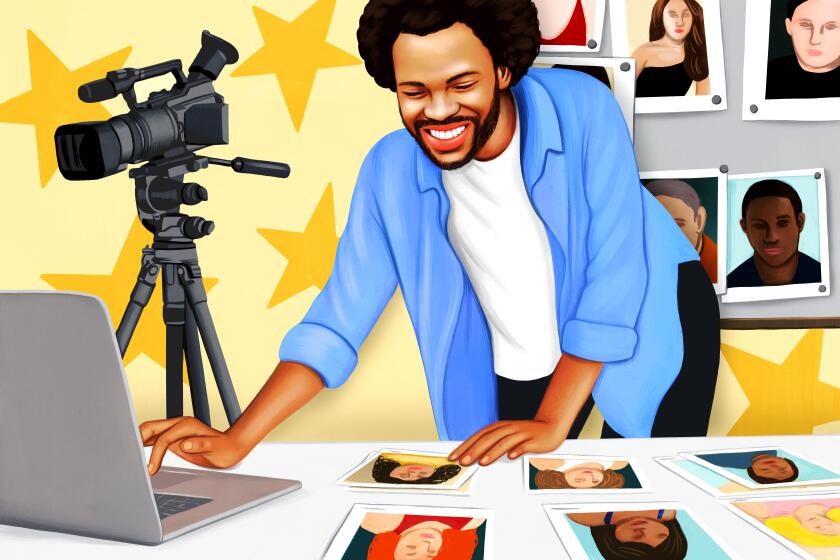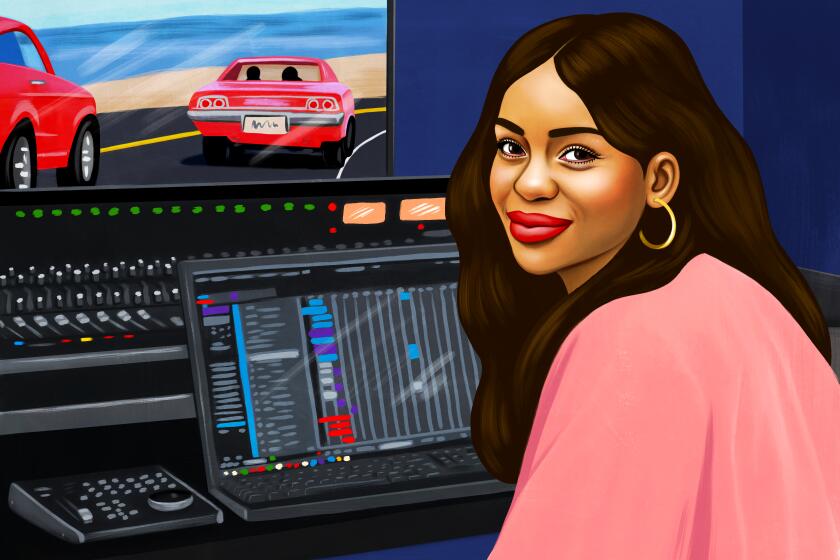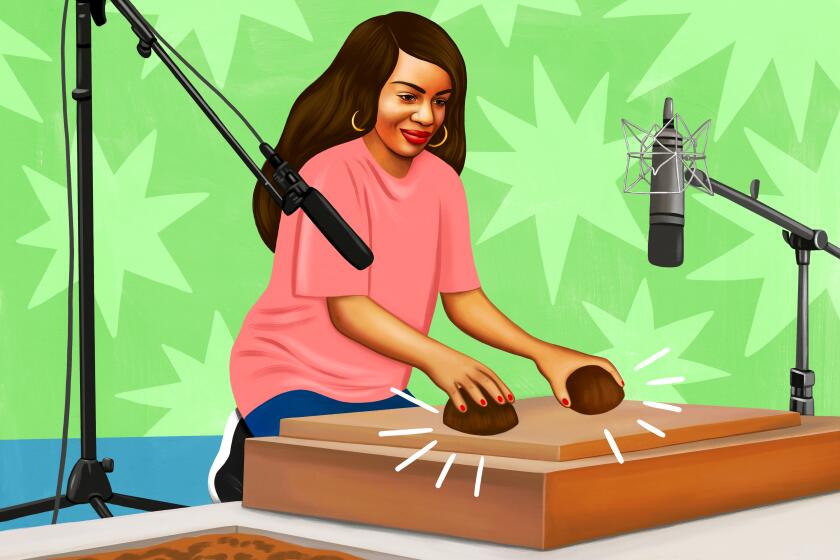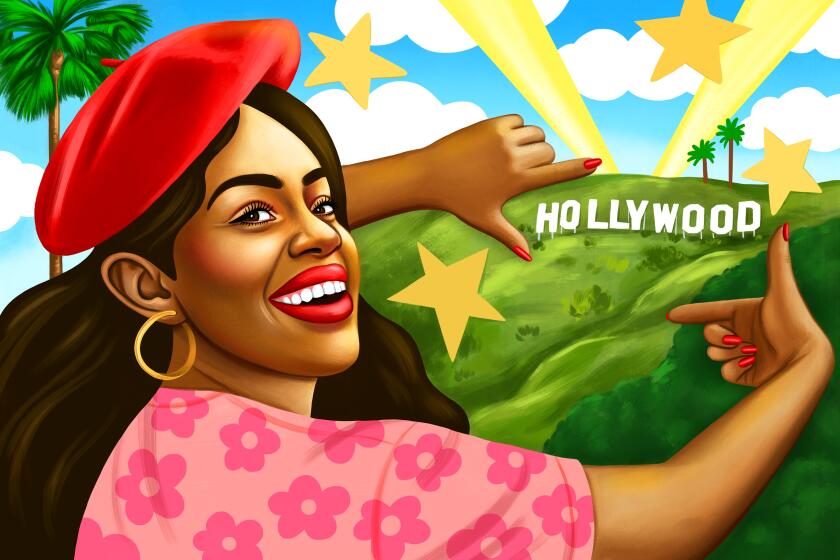Explaining Hollywood: How to get a job as a music supervisor
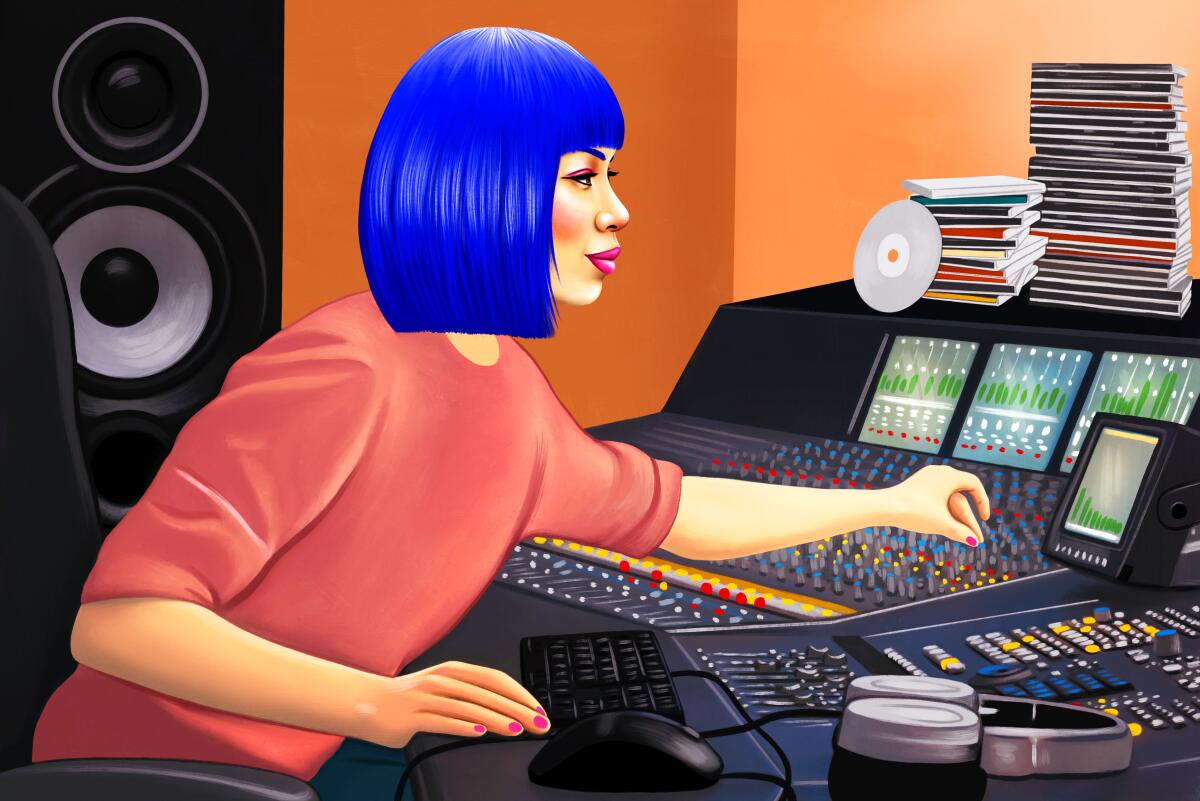
- Share via
No one says a word in the opening sequence of “The Sopranos,” but you’d never think to watch it with the sound off.
It’s not that the vistas of industrial and working-class New Jersey are particularly evocative. It’s the song that plays as mobster Tony Soprano drives through them — Alabama 3’s “Woke Up This Morning,” a propulsive, bluesy number about loss and unfulfilled promise — that transforms the sequence into something tense and menacing, hinting at the violence that will eventually erupt on screen.
The crew member who’s responsible for marrying the right recorded music to scenes in a film or TV show is called the music supervisor. Most projects also have a composer who handles the musical score written for them. The music supervisor and the composer, along with other top creatives on a project, decide which scenes will have recorded songs, original music or both.
Yet the creative aspect is just one part of the music supervisor’s job. Supervisors also have to make sure the production has permission to use the music that’s playing, whether it’s a full song or just a snippet heard in the background when a character walks through a room.
They also have to contend with last-minute changes and tough deadlines. Oh, and yes, they’ll have to try to please the multiple people — producers, showrunners, directors, editors, writers — who have ideas for which songs should play when.
“Everyone who works on the movie knows two things,” says music supervisor George Drakoulias. “They know how to do their job, and they know what the music should be — because everyone has a visceral reaction to music.”
To find out which sorts of people become music supervisors and how they get those jobs, The Times talked to Drakoulias and six other current and former music supervisors — Gary Calamar, Thomas Golubić, Jen Malone, Morgan Rhodes, Robin Urdang and Dan Carlin — as well as Dan Koplowitz and Danny Benair, two “sync agents” who try to get their clients’ songs placed in films, TV shows, advertisements and video games. Here’s what they had to say.
Who becomes a music supervisor?
One thing that most of the pros interviewed have in common is a history in or around the music industry. That reflects a common, deep-seated love of music.
Drakoulias still produces records. Calamar, Golubić and Rhodes are current or former DJs at KCRW-FM. Malone was a publicist for garage rock bands in Boston. Urdang worked for the vocal group Manhattan Transfer. Koplowitz ran a record label. Benair played drums for indie bands, including the Quick and the Three O’Clock.
But when asked what interests or skills makes a person a good fit for this job, they started by rattling off a number of more practical qualities that characterize a music supervisor.
They’re highly organized, detail-oriented and capable of managing the flow of a lot of information, because they may be working on multiple projects at the same time.
They’re diplomatic, skilled at reading a room and forming consensus, because the songs have to work not for them, but for the people in charge of the storytelling. Half joking, Urdang put it this way: “You have to have a minor or a major in psychology, because it’s so political. You have to be able to read and deal with a lot of personalities.”
Remember, a music supervisor can’t just dictate a show’s soundtrack as if it were a Spotify playlist. “Our job is not to pick the song,” Malone said. “Our job is to supply options, given the creative direction from the showrunners.”
The process can be “kind of heartbreaking,” Calamar said. “Sometimes I will come in with a song that I think is so perfect, and I can’t believe I’ve nailed it. And they’ll say, ‘That’s pretty good. What else you got?’”
They love to do research, because they’re called on to suggest songs from across the landscape of times, genres and regions. They may also like being ahead of the curve and unearthing little-known gems. “To me, that’s the most thrilling part,” Rhodes said. “And looking for the song is sometimes more fun to me than finding it.”
They are something of a detective too, because they have to track down the songwriters, typically represented by music publishers, and recording artists (or their record labels) who hold the copyrights to the songs their project wants to use. Older tracks may belong to rights holders who have fallen off the grid. Newer tracks may include samples, or snippets of earlier recordings, and each snippet has to be cleared as well.
For help on that front, supervisors can draw on the expertise of people like Koplowitz and Benair who represent large groups of copyright holders. “What we do and what music supervisors do, it’s a deeply symbiotic relationship,” Koplowitz said.
In June, the L.A. Times launched a guide to entertainment industry careers. We explained some of the basics and answered your questions. Here’s some of what we’ve learned so far.
They are adept at negotiating and understanding contracts, because they have only so much money to spend on licensing. “A rights holder can say no for any reason,” said Koplowitz, who runs Friendly Fire Licensing. “The reason doesn’t have to be a good one. They can say no because it’s not enough money. They can say no because it’s not a good look for them.”
There are many different ways a song can be used in a project, and there’s no price list — “It’s all negotiable,” Calamar said.
Generally speaking, the bigger the artist and the more prominent the use, the higher the fee will be.
For example, Drakoulias said, you may have a tiny music budget for an indie film but the director really wants to use a Rolling Stones song. So you have to think creatively about what you can offer as compensation. “First, you go to the Rolling Stones [and ask], ‘How would you like to own a piece of a heartbreaking indie coming-of-age drama that has your songs?’”
They’re also good at helping people translate their musical ideas into words. “Sometimes directors need someone to help them explain what they’re hearing or not hearing,” Drakoulias said. “If someone says, ‘I want it more purple,’ you have to be able to figure out what that means.”
And finally, they stay calm under the pressure of production deadlines, because songs can fall through at the last minute and they have to scramble to replace them.
Yes, having good taste in music matters, the pros said, but taste is subjective. More important is knowing many different types of music, being familiar with labels and music publishers, and having an open mind. And besides, as Malone put it, “You can have the best taste in music in the entire world, but if you can’t clear those songs, you can’t use them.”
Casting directors scour the talent pool of actors to find the perfect combination of people to tell a story. What you need to know about working in casting.
How do you get started?
The good news is that there are so many hours of TV shows and films being made these days that the demand for music supervision is enormous.
To develop the necessary skills, you have several options. Some colleges and film schools offer classes in music supervision taught by people who are active in the field (Malone, for instance, took a class at UCLA Extension taught by Golubić). That’s a way to learn key aspects of the job and make connections.
Another path is to intern for a music supervisor or for a studio or label executive who works with supervisors. Some internships are available through college film programs, where you’ll earn credits toward a degree but possibly no pay. Others are offered by freelance supervisors who want to train the next generation and could use the help.
“When people work for me, it’s hands-on. They’re seeing and learning everything,” Urdang said. “I want them to learn. I want the next group of music supervisors to succeed.”
One way to hear about internships is to join or volunteer at the Guild of Music Supervisors, an organization that Calamar, Golubić and Urdang helped to establish in order to raise the profession’s profile, improve collaboration, honor exceptional work and “put out a ladder of opportunity,” Golubić said. The guild offers DIY training materials and networking opportunities, which is a good way to find the supervisors looking for help.
The guild is also trying to help the profession diversify, launching a mentorship program last year, though it hasn’t announced a new round of openings yet. It has also been holding events in East Los Angeles and South L.A., Golubić said, promoting the profession to people who “didn’t know it was an option” for them.
Drakoulias suggested an additional possibility for would-be supervisors still in school. “I would just kind of gravitate toward the filmmakers in your class and offer to work on their movies,” teaching yourself about copyrights and licenses in the process, he said. “If you love music and you love films, make yourself available to people who are doing it.”
This being the entertainment industry, the relationships you make will be the keys that open doors for you. Most of the supervisors interviewed spoke of mentors they’d found who taught them the ins and outs of clearing songs, managing budgets and navigating a production’s egos.
What are the career paths?
There are two rungs on the ladder below music supervisor — assistant music supervisor and music coordinator — that you may find on larger-budget productions. According to Golubić, an assistant music supervisor provides support while gaining experience and learning the ropes. A music coordinator is capable of performing many of the supervisor’s functions, he said, but isn’t ready to lead the conversations about the choices being made.
Then there are the jobs that focus on just a portion of the music supervisor’s work. There are music consultants who specialize in the creative aspects of the job — for example, helping filmmakers make their music choices historically accurate. And there are people who specialize in obtaining licenses to the songs.
Beyond that, some supervisors opt to leave the freelance world in favor of a job at a Hollywood studio, overseeing music budgets for their productions, among other duties. Or they join a record label or a sync agency, working to get songs placed in films. Or they take a music supervising post at a company that produces trailers for movies and TV series. And some shift into film or TV production.
“I think the financial instability of the job of music supervision leads many people to essentially view it as a pathway to somewhere else,” Golubić said.
There’s a growing demand for people who can create sonic atmospheres for everything from a mobile phone app to a feature film. Here are some tips for how to get started.
How do you make money? (And what kind of money?)
There is no hourly or weekly pay scale because there is no union, although some guild members have talked of trying to form one. Nor do supervisors earn residuals or royalties.
Instead, they receive a flat fee per episode or per film. If you’re on a shoot for a year, Urdang said, the fee amounts to a couple of hundred dollars a week.
“What you get paid is informed by the budget for either the show or the film,” Rhodes said. “That will vary. Some films that are indie have very small budgets, and that may impact your fee.”
“If you want to make a living at this,” Calamar said, “you have to have multiple projects going at the same time, which can make you a little bit crazy.” People just starting out “should definitely have a backup plan and some side hustles, because there are some quiet periods.”
Urdang agreed, saying, “I’m used to it and I can handle five projects at a time or six, but if you’ve just started out, you can’t.”
It’s a very tough field to succeed in, and connections are vital to getting started. Having a background in music and dance helps.
How is this career different than it was 10 or 25 years ago?
The flip side of the explosion in content and opportunities caused by the rise in streaming video is that there are far more music supervisors competing for work. “I often say it’s harder to get the job than to do the job,” Calamar said. “Even though I’ve had some success over the years, I’m still hustling.”
Meanwhile, streaming music services have vastly simplified the task of researching songs. In the old days, Golubić said, he would have to track down physical copies of the records put out by the artists he thought might be appropriate for a project. Now, “I can do an internet search ... and potentially find some interesting options, and potentially find the people who can license them to me, in half an hour.”
Music publishers are far easier to find too. In pre-internet days, Urdang said, you’d have to get the publisher information from ASCAP and BMI, the two largest performance rights organizations, whose phones were always busy. And when you finally got through, she said, you could ask for only three songs at a time. “I had to hire people just to wait on the phone line.”
What advice do pros always hear that is wrong?
“Be dogged and persistent is, to me, a terrible piece of advice,” Golubić said. He drew a bright line between going to great lengths to find rights holders and badgering them if they decline to license their tracks. “A polite no,” he said, “is a clear no.”
Another bad technique, he said, is to send in every potentially usable song and let other people figure out what works. “If somebody values my time, I value their time,” he said.
Malone said it’s a bad idea to “just make cool playlists” and wait for things to come to you. “You have to want it, and you have to figure out a way to get it,” she said. “That goes for clearing a song or getting a gig.”
Sometimes a new producer, showrunner or director will contend that rights holders will license their songs for peanuts “because the exposure will help the artist more than money,” Calamar said. “That is just old-time thinking.” Or as Koplowitz wryly put it, “You can die from exposure. No one is asking the craft services team or the camera crew to donate their work for free.”
Rejection and uncertainty are part of working in Hollywood, but joy, creativity and fun can be too. Here’s how to manage your mental health.
What’s some good advice?
People who are just starting out “should know that it’s literally not just picking songs” that match their taste, Urdang said. “It’s having a knowledge of what works in a scene and why, and understanding what it is the director is trying to say, what you want the audience to feel.”
Speaking for many of her colleagues, Rhodes advised would-be supervisors, “Learn clearance. If you like a song, start looking up who wrote that song. Who’s got the publishing?”
Urdang tells the cautionary tale of how she spent less than her budget during the first season of “Burn Notice,” only to have her budget cut for Season 2. “Do not come in under budget,” she said. “It does not do any good for anybody.”
“You’re never going to make it if you’re not passionate about it,” Urdang warned. “Because it’s a lot of hard work. And it’s a lot of politics. You have to please a lot of people. ... You have to be open. You can’t take things personally. You can’t have an ego.”
Drakoulias offered one last pro tip: Don’t promise you can get a song by the Beatles.
Careers in the entertainment industry can be mysterious for those just starting out, and even for those working in the business. The Los Angeles Times brings you explainers and advice for starting and building your career in Hollywood.
More to Read
Inside the business of entertainment
The Wide Shot brings you news, analysis and insights on everything from streaming wars to production — and what it all means for the future.
You may occasionally receive promotional content from the Los Angeles Times.

